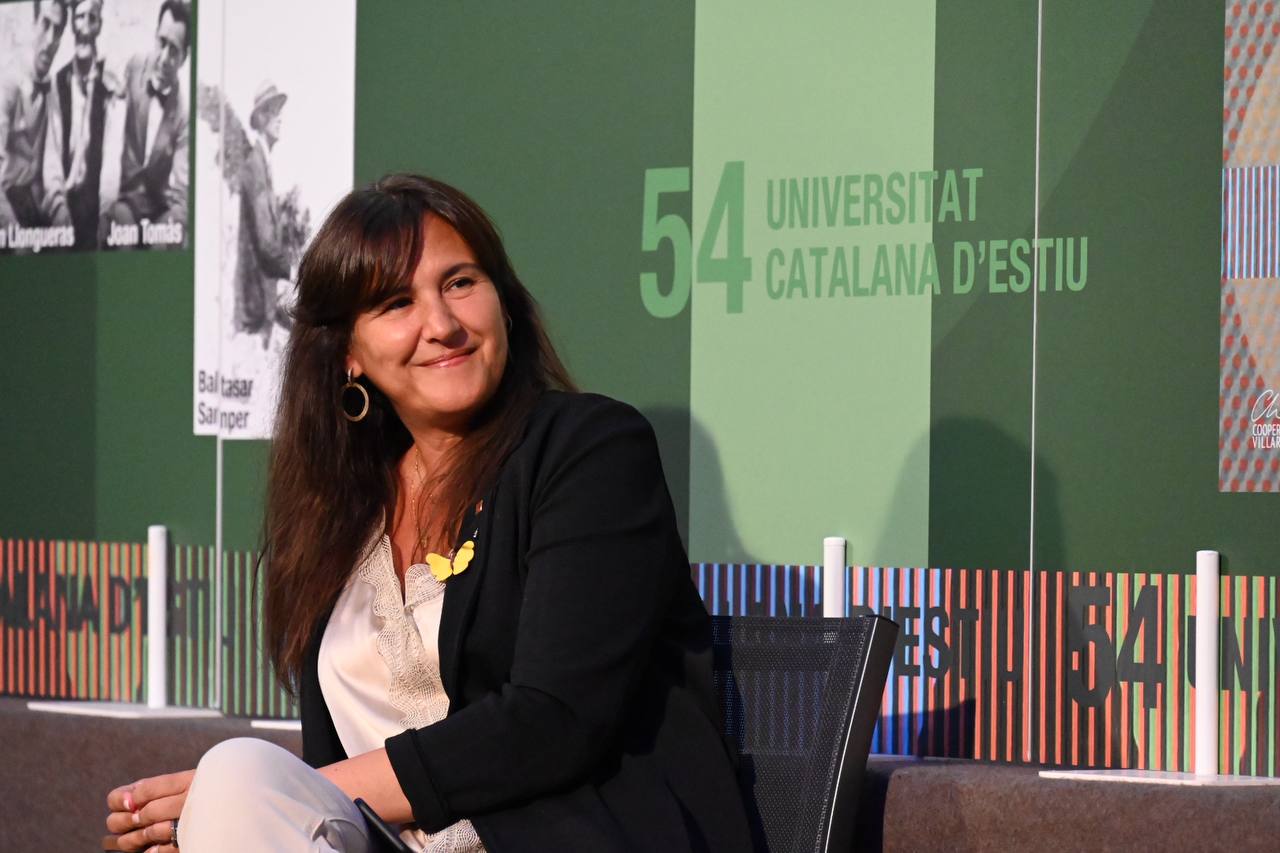Laura Borràs reenters the scene. The suspended speaker of the Catalan parliament took to the lectern this Tuesday at an event held in Prada de Conflent (Northern Catalonia) as part of the Catalan Summer University. With the title 'The limits of parliamentarianism', her speech began with a warning by the Junts leader that she intended to focus fundamentally on the subject she had elected. "Many were thinking I would use my time to speak at length about my suspension, but I won't." Nevertheless, at various points in her address, Borràs did launch attacks on points related to current issues. The hottest of these potatoes was, without a doubt, her suspension as speaker of parliament at the end of July - with this address being one of her first public interventions since then.
The Junts president referred to the matter on several occasions, as well as launching criticisms at those responsible for her suspension. She defended that she has always tried to apply Parliament's regulations scrupulously, and therefore regretted that "biased" use was made of the rules to remove her from office. "If politically it has seemed wrong to us that judges acted as judges, I find it difficult to understand that some politicians chose to act as judges", she said in reference to the MPs who make up the parliamentary procedural Bureau: the Socialists of the PSC, and members of two pro-independence parties, ERC and the CUP. In addition, she accused them of carrying out the action with "too much frivolity, political intent and partisanship".
Not only that, but in her final sentences she again gave prominence to this issue, stating that presiding over the Catalan chamber is not a pleasant or comfortable task. "And I can affirm that, although your rights and duties can be suspended arbitrarily, the commitment to independence depends on your inner will, and no one can suspend that," she added. Borràs spoke very briefly about the possibility of someone temporarily replacing her at the head of the institution while her trial is held. It is a proposal that Junts has repeatedly rejected, and today the party president also did so when she defended her decision to "not step aside, only step forward because the state wants us to step backwards". Throwing a gybe at the president of Catalonia, Pere Aragonès, she asserted that "those who complain" about the interim status in the institutions are the ones who have "provoked" it.
Borràs also sketched out the events that occurred last week, when controversy erupted during the tribute to the victims of the Catalonia terrorist attacks, on the fifth anniversary of the tragedy, due to demonstrators interrupting the minute of silence with shouts, and Laura Borràs's later gesture of walking over to greet them. She did not respond to the criticisms on the day, unlike some Junts colleagues who are part of her closest circle and sought to push back against the images circulating on social media. In Prada, however, Borràs noted that people "judged" her actions "using videos to make it look like something it was not".
"Party self-criticism needed" to achieve independence
Beyond these issues, the protagonist of the closing session of the 54th Catalan Summer University focused at length on the limits of parliamentarianism, mentioning the interference of the Spanish courts in the Catalan chamber's work. "It is not normal that saying or doing certain things entails disqualification or suspension, or for laws that have been passed to be suspended or curtailed by the Constitutional Court." With regard to specific cases, she referred to the failed 2018 investitures of Carles Puigdemont and Jordi Turull, the 2020 sacking of Quim Torra and the situations of MPs Lluís Puig and Pau Juvillà. In addition, she also proudly spoke of some personal gestures such as rejecting travel allowances and giving up her credit card as speaker, as well as her dialectical confrontations with Spanish nationalists in the chamber.
However, Laura Borràs did not stop there, but also spoke about the current situation of the independence movement. The 52% of votes won by the pro-independence parties in the last election raised expectations "that have not been met", she said, recalling that Pere Aragonès also promised to complete the independence process. "Since it has not happened, self-criticism from the parties is not only appropriate, but also necessary and indispensable." Thus, she remarked that it is up to the pro-independence parties to stitch their relationships back together complicities for a new offensive to move away from the dialogue table.
"They say that people are disenchanted; how are they are not to be if they tell us there are not enough of us, that the state is very powerful, that the mountain is very high and that independence is not possible?" she asked rhetorically. "This is false, and by saying it they want it to be a self-fulfilling prophecy." According to Borràs, the majority exists, and now "only political will and planning is needed". "Being clear about this is a basic and fundamental first step, because independence is necessary, essential and unpostponable."

